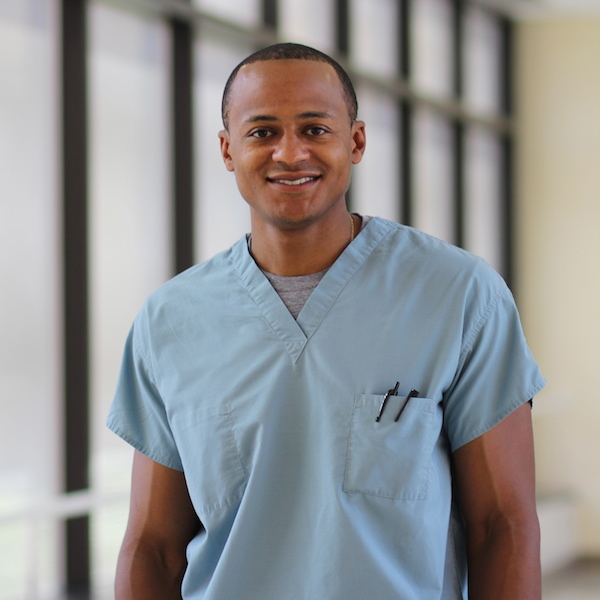
DESCRIBE A TYPICAL DAY AS A RESIDENT: Each day can vary slightly depending upon what rotation you are on and what responsibilities you have, but most days will begin somewhere between 5 to 5:30 a.m. When on an OR rotation, I arrive around 5:30 and begin setting up my room according to the anesthetic plan formulated the previous night with my attending. I then attend morning lecture at 6 a.m., prior to seeing my patient and starting my first case. Cases and responsibilities vary among rotation and year of training as well. As a CA3, I am also able to take on supervisory and instructional roles when I am not the primary provider. Some rotations, such as ICU, require team rounding after you arrive, while others, such as the pain clinic, require you to assess patients in the clinical setting. The different rotations ensure a broad clinical experience and help to keep things interesting.
WHY DID YOU CHOOSE ANESTHESIOLOGY AS YOUR SPECIALTY? I chose anesthesiology because it challenged my medical knowledge and afforded me the opportunity to use my natural skill sets in a fast paced environment. I was impressed by the amount of knowledge of human physiology that was required to be a successful anesthesiologist and enjoyed the immediate impact that our medications had on patients. I was also drawn to the procedural aspect of anesthesiology. It allowed me to use my hands for multiple technical, yet short procedures. Lastly, I felt that it gave me a great opportunity to connect with my patients in a truly stressful time. As an anesthesiologist, you have a short window of time to see your patients and put them and their families at ease before they undergo surgery.
WHAT ARE THE CHALLENGES YOU FACE IN RESIDENCY? One of the biggest challenges is maintaining an appropriate work/life balance. There is always more that you can learn, but you need to take time for yourself as well. I felt like I was able to meet this challenge well with the support of this program.
WHAT DO YOU DO FOR FUN? I really enjoy being able to travel when I have the chance. During my time here I have been able to combine this desire with work through medical mission trips to Nicaragua and Belize. I am also a big sports fan and enjoy watching games with my colleagues if I'm unable to attend them in person. To keep in shape, I also make time for running and working out.
WHY DID YOU CHOOSE UAB FOR ANESTHESIA RESIDENCY? I chose UAB for multiple reasons. I was sold on the people that were in place when I came to visit. We have a department chair that is a leader in the field and is constantly pushing our program forward on a national and institutional level. Our program director has our best interests at heart and is willing to work hard to enhance our educational experience. I think that the residents here are one of a kind. They are hard working, friendly, and never fail to help one another out in a time of need. Lastly, I knew that this program was going to train me to be a great anesthesiologist, but I also felt that the other programs and opportunities provided here would make me more valuable to my future employers.
WHAT ARE YOUR PLANS AFTER FINISHING YOUR RESIDENCY? After residency, I will start a cardiothoracic anesthesia fellowship at UAB. I am happy to have the opportunity to stay at UAB and to help train the classes behind me.
WHAT’S THE ONE THING YOU WISH SOMEONE HAD TOLD YOU TO BETTER PREPARE YOU TO BE A CHIEF RESIDENT?
-There are multiple solutions to every problem, but none of them are likely to please everyone.
- Take adequate time to effectively respond to questions or make statements, and do your best to eliminate ambiguity within your communication.
- Take a minute to enjoy the time you get learning from departmental leadership and getting to work for your peers.
WHAT DO YOU THINK ARE THE QUALITIES OR CHARACTERISTICS OF A GOOD ANESTHESIOLOGIST?
- Vast understanding of human physiology and how to apply it in multiple situations
- Ability to stay focused in high pressure or chaotic situations
- Effective communication
- Competent technical skill set
- Ability to work well in a team setting